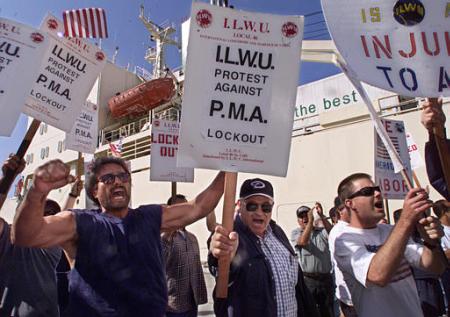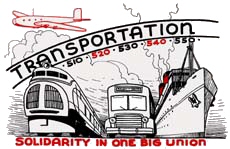Submitted on Thu, 10/13/2011 - 4:39pm
Greetings Fellow Workers,
On behalf of our Union, the Richmond, Virginia General Membership Branch of the Industrial Workers of the World stand in solidarity with the United States Postal Workers Union and its effort to preserve the peoples post office from further privatization.
In 1967 U.S. President Lyndon B. Johnson appointed a Commission on Postal Reorganization, chaired by AT&T’s Frederick R. Kappel, to “determine whether the postal system as presently organized is capable of meeting the demands of our growing economy and our expanding population.” In June 1968, the Commission found that it was not.[1]
Submitted on Sat, 08/07/2010 - 2:53am
The following Resolution was adopted by a unanimous voice vote at its August 2010 General Membership Branch Meeting held Thursday, August 5, 2010:
 [Begin]
[Begin]
The Industrial Workers of the World (IWW) acknowledge that police violence is a tragic yet common occurrence in working class communities and for people of color. A notable example took place January 1, 2009, when BART police officer Johannes Mehserle brutality shot and killed 22-year-old Oscar Grant without justification. Mehserle was convicted of involuntary manslaughter and will be sentenced November 5, 2010.
The IWW firmly rejects police violence and stands beside the family and friends of Oscar Grant. In recognizing that ‘an injury to one is an injury to all’ the IWW is in solidarity with organized labor and members of the Bay Area community who seek justice for Oscar Grant and jail for Johannes Mehserle.
Furthermore, the IWW strongly supports the planned demonstration by labor and community groups Saturday October 23, 2010 at Oakland City Hall and joins in the call to ‘jail killer cops.’
[End]
Note: The original call out was made by ILWU Local 10,
AFL-CIO
Submitted on Thu, 10/05/2006 - 2:47pm
Disclaimer - The following article is reposted here because it is an issue with some relevance to the IWW. The views of the author do not necessarily agree with those of the IWW and vice versa.
By Meredith Schafer and Chris Kutalik - Monthly Review, October 5, 2006
 Millions of dollars worth of goods sat unmoved on the docks of the United States' largest port, Los Angeles/Long Beach, as port truckers, mostly Latino immigrants, struck on May 1. Despite being organized only informally in small networks, the truckers were able to use their position at a vital point in the economy to multiply their power.
Millions of dollars worth of goods sat unmoved on the docks of the United States' largest port, Los Angeles/Long Beach, as port truckers, mostly Latino immigrants, struck on May 1. Despite being organized only informally in small networks, the truckers were able to use their position at a vital point in the economy to multiply their power.
Submitted on Thu, 08/10/2006 - 8:43pm
 Mansoor Ossanlou, the jailed president of Tehran’s bus workers’ union (the Syndicate of Workers of Tehran and Suburbs United Bus Company), was released at 3.30 pm local time today, 9th August, after spending over seven and a half months in prison. He was warmly greeted by his family and colleagues.
Mansoor Ossanlou, the jailed president of Tehran’s bus workers’ union (the Syndicate of Workers of Tehran and Suburbs United Bus Company), was released at 3.30 pm local time today, 9th August, after spending over seven and a half months in prison. He was warmly greeted by his family and colleagues.
Ossanlou’s release comes following seven months of struggle without let up by Tehran’s bus workers and the massive international solidarity that took shape for his release over this period. He was jailed for organising the bus workers and defending their rights. His release is a clear victory for the workers and people in Iran.
In a statement released today, WPI congratulated Mansoor Ossanlou, his family, the bus workers and all trade unions, organisations and individuals who fought in the great campaign for his release. “Ossanlou was freed from prison by the bus workers and all those fantastic people in Iran and outside Iran who fought hard and put pressure on the Islamic Republic”, the statement said. It called for the unconditional release of all political prisoners in Iran, the recognition of the bus workers’ union and an end to the persecution of labour activists.
Ends.
----------------------------------------------------------------------------------
International Labour Solidarity Committee of the
Worker-communist Party of Iran
Co-ordinator: Shahla Daneshfar ([email protected])
Public Relations: Bahram Soroush ([email protected])
www.kargarn.org www.wpiran.org
http://lnn.laborstart.org/more.php?id=778_0_1_0_M
Submitted on Wed, 04/05/2006 - 7:25pm
Disclaimer - The following article is reposted here because it is an issue with some relevance to the IWW. The views of the author do not necessarily agree with those of the IWW and vice versa.
By Richard D. Vogel - Monthly Review, February 2006.
¡Pobre México! Tan lejos de Dios, y tan cerca de los Estados Unidos.
(Poor Mexico! So far from God, and so close to the United States.)
—General Porfirio Díaz, President of Mexico, 1877–1911
 Capital’s relentless search for cheap labor constantly alters the flow of surface transportation in North America with widespread consequences. The end-of-century deindustrialization of the United States and importation of cheap commodities from the Far East through the West Coast reversed historical east-west transportation patterns and established Los Angeles and Long Beach as the largest ports in the nation. To minimize transportation costs, which for many products are higher than the cost of production, intermodal transportation of containerized imports was developed. Manufactured goods are packed into mobile shipping containers at factories in the Far East and travel by ship, train, and truck to distribution centers and, ultimately, consumer outlets across the United States. Currently, intermodal transportation of cheap imported commodities is the lifeline of the American economy. In 2004, the Port of Los Angeles processed 7.3 million container units and Long Beach handled 5.8 million. These two ports alone accounted for 68 percent of the West Coast total and are, by far, the largest employers in California. U.S. workers, who have seen so many lucrative manufacturing jobs moved overseas, assumed that import transportation and distribution jobs could not be offshored and were, therefore, relatively secure.
Capital’s relentless search for cheap labor constantly alters the flow of surface transportation in North America with widespread consequences. The end-of-century deindustrialization of the United States and importation of cheap commodities from the Far East through the West Coast reversed historical east-west transportation patterns and established Los Angeles and Long Beach as the largest ports in the nation. To minimize transportation costs, which for many products are higher than the cost of production, intermodal transportation of containerized imports was developed. Manufactured goods are packed into mobile shipping containers at factories in the Far East and travel by ship, train, and truck to distribution centers and, ultimately, consumer outlets across the United States. Currently, intermodal transportation of cheap imported commodities is the lifeline of the American economy. In 2004, the Port of Los Angeles processed 7.3 million container units and Long Beach handled 5.8 million. These two ports alone accounted for 68 percent of the West Coast total and are, by far, the largest employers in California. U.S. workers, who have seen so many lucrative manufacturing jobs moved overseas, assumed that import transportation and distribution jobs could not be offshored and were, therefore, relatively secure.
 [Begin]
[Begin] Millions of dollars worth of goods sat unmoved on the docks of the United States' largest port, Los Angeles/Long Beach, as port truckers, mostly Latino immigrants, struck on May 1. Despite being organized only informally in small networks, the truckers were able to use their position at a vital point in the economy to multiply their power.
Millions of dollars worth of goods sat unmoved on the docks of the United States' largest port, Los Angeles/Long Beach, as port truckers, mostly Latino immigrants, struck on May 1. Despite being organized only informally in small networks, the truckers were able to use their position at a vital point in the economy to multiply their power.
 Capital’s relentless search for cheap labor constantly alters the flow of surface transportation in North America with widespread consequences. The end-of-century deindustrialization of the United States and importation of cheap commodities from the Far East through the West Coast reversed historical east-west transportation patterns and established Los Angeles and Long Beach as the largest ports in the nation. To minimize transportation costs, which for many products are higher than the cost of production, intermodal transportation of containerized imports was developed. Manufactured goods are packed into mobile shipping containers at factories in the Far East and travel by ship, train, and truck to distribution centers and, ultimately, consumer outlets across the United States. Currently, intermodal transportation of cheap imported commodities is the lifeline of the American economy. In 2004, the Port of Los Angeles processed 7.3 million container units and Long Beach handled 5.8 million. These two ports alone accounted for 68 percent of the West Coast total and are, by far, the largest employers in California. U.S. workers, who have seen so many lucrative manufacturing jobs moved overseas, assumed that import transportation and distribution jobs could not be offshored and were, therefore, relatively secure.
Capital’s relentless search for cheap labor constantly alters the flow of surface transportation in North America with widespread consequences. The end-of-century deindustrialization of the United States and importation of cheap commodities from the Far East through the West Coast reversed historical east-west transportation patterns and established Los Angeles and Long Beach as the largest ports in the nation. To minimize transportation costs, which for many products are higher than the cost of production, intermodal transportation of containerized imports was developed. Manufactured goods are packed into mobile shipping containers at factories in the Far East and travel by ship, train, and truck to distribution centers and, ultimately, consumer outlets across the United States. Currently, intermodal transportation of cheap imported commodities is the lifeline of the American economy. In 2004, the Port of Los Angeles processed 7.3 million container units and Long Beach handled 5.8 million. These two ports alone accounted for 68 percent of the West Coast total and are, by far, the largest employers in California. U.S. workers, who have seen so many lucrative manufacturing jobs moved overseas, assumed that import transportation and distribution jobs could not be offshored and were, therefore, relatively secure.